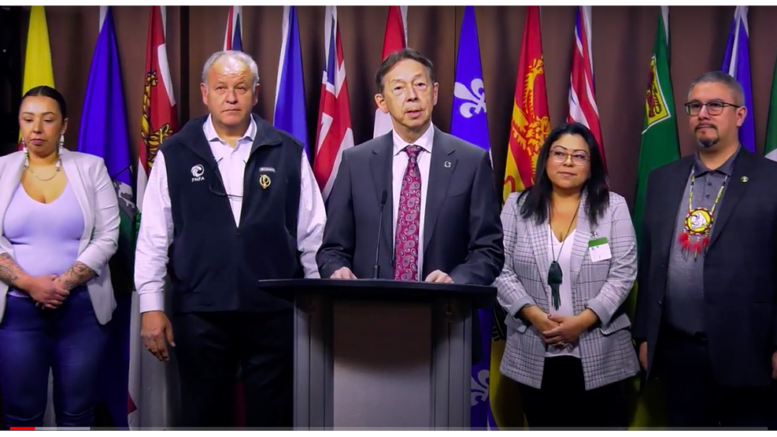By Jeremy Appel, Local Journalism Initiative Reporter
(ANNews) – The First Nations Finance Authority (FNFA) is calling on the federal government to fund First Nations infrastructure projects the same way it funds municipal and provincial projects to fulfill its promise to bridge the infrastructure gap between First Nations and the rest of Canada by 2030.
A news release from FNFA says this relationship would be rooted in “partnership rather than paternalism.”
The FNFA is a non-profit created by the federal government to provide low-interest loans for First Nations infrastructure projects and economic development. It’s provided $1.8 billion in loans since its 2005 inception.
According to a BTY Group report commissioned by the Assembly of First Nations, however, there’s a $349.2-billion infrastructure gap in First Nations communities, consisting of capital and operating costs.
“The federal model for funding infrastructure has failed to deliver the housing, clean water and other critical infrastructure that will improve the living conditions in First Nations communities,” said Ernie Daniels, FNFA president and CEO. “We believe there is a better way, a way that works with First Nations as partners rather than the colonial approach that’s rooted in the almost 150-year-old Indian Act.”
The process would begin with the feds setting aside $200 million in its budget for First Nations infrastructure, with the amount of funding increasing annually as the program grows in scope. FNFA would issue a debenture — a bond that is unsecured by collateral — to build priority infrastructure while the federal funds service the debenture payments.
This would allow First Nations to engage in monetization, allowing them to build immediately at today’s cost and pay back those funds over a preferred loan term.
Presently, First Nations infrastructure is funded through an “annual cash” model that doesn’t account for increasing costs over time.
Monetization funding could serve to pay for housing, clean water, replacing diesel generators with clean energy, schools, health centres, administration centres, among other community priorities.
A $200-million annual monetization payment could fund $3.6 billion in housing over 20 years, amounting to 12,000 units being built at today’s prices, according to the FNFA.
Due to inflation, annual cash payments would fund far fewer houses over the same time span.
“Monetization would be a new tool that could put shovels in the ground now to address the critical shortage of decent infrastructure in our communities,” said Chief Warren Tabobondung of Wasauksing First Nation in Ontario, who is also the FNFA chair.
Chief Derek Epp of Tzeachten First Nation in B.C., who’s also the FNFA vice-chair, said monetization isn’t a “silver bullet” for closing the infrastructure gap, but it could help kickstart the process of “economic reconciliation.”
The federal budget unveiled on March 29 didn’t adopt monetization for First Nations infrastructure projects, but did commit $4 billion for co-developed Indigenous housing strategy for Indigenous peoples living outside their home communities.
According to the Assembly of First Nations’ (AFN) pre-budget submission, $63.3 billion is needed to bring on-reserve housing levels to those of the rest of Canada by 2040. Over the next five years, First Nations also require $20.5 billion for general infrastructure, $4.5 billion for drinking water and wastewater, $10.2 billion for green infrastructure, and $6.9 billion for education facilities, all over five years.
AFN Chief Roseanne Archibald told CBC News that if the government is serious about reaching its 2030 target, it needs to develop an “economic new deal” for First Nations.
“This prime minister is a performative reconciliationist,” Archibald said. “First Nations are not looking for a handout. We’re looking for the opportunities that are the birthright of our people.”
She expressed frustration that the AFN’s “reasonable” funding requests are repeatedly denied.
“What we see the federal government do is chronically, intentionally underfund us, and so they’re creating this cycle of poverty,” she said.
An April 2022 report from the Commons Standing Committee on Indigenous and Northern Affairs recommended the federal government implement a monetization pilot project for replacing diesel generation with clean energy in remote communities.
FNFA CEO Daniels pitched this pilot as a way for the federal government to close the infrastructure gap while taking concrete steps to reducing carbon emissions in a January 2022 Policy Options article.
“It’s good for the environment, but it also makes sound economic sense to start building the infrastructure now at today’s costs, at today’s lower interest rates, rather than waiting another decade or so to wean communities off diesel when inflation would only drive the capital costs higher,” Daniels wrote.



Be the first to comment on "FNFA pitches monetization for addressing Indigenous infrastructure gap"